Search
Civil Engineering/Civil Engineering (Technical Route) MSc
Study level: Postgraduate
Become the best you can be in the construction industry with an accredited master’s in civil engineering from Coventry University.
Course features
Year of entry
Location
Coventry University (Coventry)
Study mode
Full-time
Part-time
Sandwich
Duration
1 year full-time
2-3 years part-time
2 years sandwich
Course code
EECT022 (Civil Engineering MSc)
EECT023 (Civil Engineering Technical Route MSc)
Start date
September 2024
January 2025
May 2025
Course overview
The Civil Engineering MSc is offered to UK civil engineering and cognate science/engineering graduates seeking a professional qualification as Chartered Engineers.
- The Civil Engineering (Technical Route) MSc is available for holders of an overseas bachelor’s degree or a UK bachelor’s degree accredited as the educational base for an Incorporated Engineer (IEng), for example a BSc in Civil Engineering or cognate science/engineering disciplines, for those seeking a professional qualification as Chartered Engineers through a ‘Technical Route’.
- The courses are designed to develop high-level knowledge and wide-ranging understanding of the planning, design, construction and operation of civil engineering works, exploring the traditional and innovative practices behind iconic constructions such as Wembley Stadium.
- They also aim to provide students with practical knowledge and innovative strides applicable to strategic management of construction and engineering projects, including relevant importance of Building Information Modelling (BIM) in construction project management.
- You will have the option to apply for a 'work placement' opportunity2, designed to further develop your skills and knowledge with the aim of maximising your employability prospects. See modules for more information.
Joint Top Modern University for Career Prospects
Guardian University Guide 2021 and 20225 QS Stars for Teaching and Facilities
QS Stars University RatingsTop 5 UK Student City in England (Coventry)
QS Best Student Cities Index 2024Why you should study this course
From concept to construction, we aim to cover the technical skills required to analyse, design and develop sound solutions to civil engineering projects. Using case studies, practical sessions, simulation labs and site visits to live projects (subject to availability), you will apply engineering principles and use computer modelling techniques to analyse complex engineering systems, gaining valuable experience of the work you will carry out in an industrial context. Past projects have included the Severn Trent building and the Coventry A45/A46 by-pass.
- These highly practical courses are delivered with input from industry to help you establish or advance your career in the construction industry. Accredited1 by the Joint Board of Moderators (JBM), the courses meet the educational base for Chartered Engineer (CEng) status and successful completion provides automatic progression for holders of an accredited bachelor’s degree. Further information can be found on the Engineering Council’s website.
- Coventry University offers modern facilities in our High Performance Engineering Centre, including construction site management simulation.
- We currently have links with industry and the course is delivered by academic lecturers and guest speakers (subject to availability) in collaboration with civil engineering employers, such as Underground Professional Services and Morgan Sindall.
- The courses are designed to develop knowledge and understanding of engineering principles and practices, together with methods used to analyse, design, construct and manage construction projects proficiently.
Accreditation and professional recognition
This course is accredited1 and recognised by the following bodies:

Chartered Management Institute
As part of this course, you will undertake a professional development module which is currently accredited by the Chartered Management Institute for the 2024-25 intake. Upon successful completion of this module, you will gain the CMI Level 7 Certificate in Strategic Management and Leadership Practice at no additional cost. Further details can be found on the Professional Development module homepage.

Joint Board of Moderators (JBM)
This degree is accredited by the Joint Board of Moderators (JBM) for all intakes up to and including September 2024 as meeting the requirements for Further Learning for a Chartered Engineer (CEng) for candidates who have already acquired a partial CEng accredited undergraduate first degree.
The JBM represents the Institution of Civil Engineers, The Institution of Structural Engineers, The Chartered Institution of Highways and Transportation and the Institute of Highway Engineers.
It should be noted that candidates completing the MSc who hold an underpinning accredited IEng degree or a non-accredited bachelor’s degree will need to apply for an academic assessment to determine whether they will meet the educational base for CEng registration.
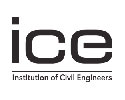
Institution of Civil Engineers
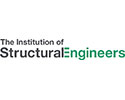
The Institution of Structural Engineers

The Chartered Institution of Highways and Transportation
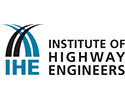
Institute of Highway Engineers
Partnerships
Coventry University has signed an academic-professional partnership agreement with The Institute of Highway Engineers (IHE) as part of IHE’s Academic-Professional Partnership Scheme. The purpose of the scheme is for the IHE to provide support, advice and guidance on the membership of a professional Institute. The IHE can also provide advice and assistance on the routes toward professional registration for students studying civil engineering with a particular interest in highways and transportation. For more information visit the IHE website.
What you'll study
You will have the opportunity to learn the laboratory testing procedures and techniques used to assess material and structural performance, using modern and upgraded loading equipment automated with data loggers, saturated and unsaturated stress path soil testing apparatus and commercial civil engineering material mixing and synthesising equipment.
The courses culminate in a research project, during which you should be able to apply the theoretical and practical knowledge acquired so far from your academic training on real structural problems.
With work placement pathway
The ‘With work placement’ opportunity2 enables you to apply in semester 1 for an optional work placement of up to 12 months, extending the duration of your master’s to 24 months. The placement provides an opportunity for you to develop expertise and experience in your chosen field with the aim of enhancing your employability upon graduation. The work placement would take place in semesters 3, 4 and 5.
Please note that the optional placement modules will incur an additional tuition fee of £4,000. Placement opportunities may also be subject to additional costs, visa requirements being met, subject to availability and/or competitive application. Work placements are not guaranteed but you will benefit from the support of the Talent Team in trying to find and secure an opportunity. Find out more about the work placement option.
We regularly review our course content, to make it relevant and current for the benefit of our students. For these reasons, course modules may be updated.
How you'll learn
Teaching methods may include:
- Lectures
- Seminars
- Tutorials
- Presentations
- Group projects
- Workshops
- Practical laboratory sessions
This course can be studied on a full-time or part-time basis. Whilst we would like to give you all the information about our part-time offering here, it is tailored for each course each year depending on the number of part-time applicants. Therefore, the part-time teaching arrangements vary. Please request information about studying this course part-time.
Teaching contact hours
The number of contact hours may vary from semester to semester, however, on average, it is likely to be around 16 contact hours per week in the taught semesters. Additionally, you will be expected to undertake significant self-directed study of approximately 35 hours each week, depending on the demands of individual modules.
The contact hours may be made up of a combination of face-to-face teaching, individual and group tutorials, and online classes and tutorials.
As an innovative and enterprising institution, the university may seek to utilise emerging technologies within the student experience. For all courses (whether on-campus, blended, or distance learning), the university may deliver certain contact hours and assessments via online technologies and methods.
Since COVID-19, we have delivered our courses in a variety of forms, in line with public authority guidance, decisions, or orders and we will continue to adapt our delivery as appropriate. Whether on campus or online, our key priority is staff and student safety.
Assessment
This course will be assessed using a variety of methods which could vary depending upon the module. Assessment methods may include examinations, written tests, computer modelling work, viva, your thesis and coursework, consisting of analysis and evaluation of several laboratory exercises, case study assignments and projects.
The Coventry University assessment strategy aims to ensure that our courses are fairly assessed and allows us to monitor student progression towards achieving the intended learning outcomes.
International experience opportunities
Civil engineering is a global industry, and this course has previously attracted students from around the world, including Europe, China, Africa, India, Brunei, Malaysia and the Middle East, providing a multicultural learning experience.
The content of these courses continuously refers to the international context in which civil engineering takes place, drawing on case studies such as the collapse in 1940 of the Tacoma Narrows Bridge and the design and construction of the new twin suspension bridges over the Tacoma Narrows strait of Puget Sound in Pierce County, Washington.
Please note that all international experience opportunities may be subject to additional costs, competitive application, availability and meeting applicable visa and travel requirements are therefore not guaranteed2.
Entry requirements
Typical offer for 2024/25 entry.
Fees and funding
2024/25 tuition fees.
| Student | Full-time | Part-time |
|---|---|---|
| UK, Ireland*, Channel Islands or Isle of Man | £11,200 | £4,000 (Work placement option additional fee) per year | Request fee information |
| EU | £11,200 | £4,000 (Work placement option additional fee) per year with EU Support Bursary** £18,600 | £4,000 (Work placement option additional fee) per year without EU Support Bursary** |
Not available |
| International | £18,600 | £4,000 (Work placement option additional fee) per year | Not available |
For advice and guidance on tuition fees3 and student loans visit our Postgraduate Finance page and see the university's Tuition Fee and Refund Terms and Conditions.
We offer a range of International scholarships to students all over the world. For more information, visit our International Scholarships page.
Tuition fees cover the cost of your teaching, assessments, facilities and support services. There may be additional costs not covered by this fee such as accommodation and living costs, recommended reading books, stationery, printing and re-assessments should you need them.
The following are additional costs not included in the tuition fees:
- Any optional overseas field trips or visits: £400+ per trip.
- Any costs associated with securing, attending or completing a placement (whether in the UK or abroad).
*Irish student fees
The rights of Irish residents to study in the UK are preserved under the Common Travel Area arrangement. If you are an Irish student and meet the residency criteria, you can study in England, pay the same level of tuition fees as English students and utilise the Tuition Fee Loan.
**EU Support Bursary
Following the UK's exit from the European Union, we are offering financial support to all eligible EU students who wish to study an undergraduate or a postgraduate degree with us full-time. This bursary will be used to offset the cost of your tuition fees to bring them in line with that of UK students. Students studying a degree with a foundation year with us are not eligible for the bursary.
Facilities
The faculty’s Engineering and Computing Building4 and new Beatrice Shilling Building are designed to support hands-on learning. Our Sir John Laing Building also houses a variety of industry-standard labs and equipment.
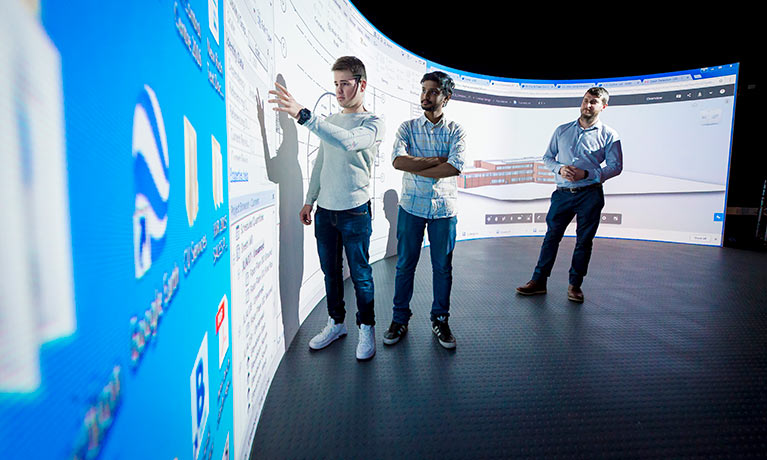
Simulation Centre
Our interactive training centre includes a ‘virtual’ construction site with fully equipped site cabins and an observation deck. Here, you can take part in role-play exercises to prepare you for a range of situations in the workplace.
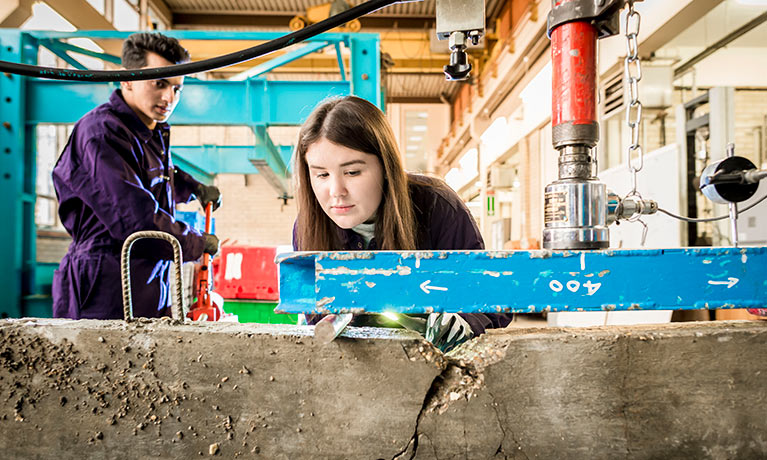
Structures laboratory
Includes eight test frames, two of which are fully programmable ‘top of the range’ Instron universal test machines. It also includes a strong floor area with associated framing and ancillary measurement devices.
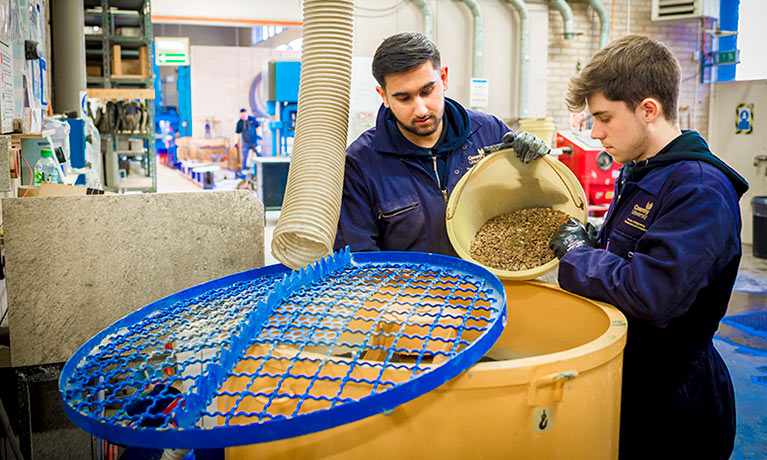
Materials laboratory
Includes industrial standard timber and steel workshops, a concrete mixing area with three pan mixers, programmable environmental chambers, a range of ovens and curing tanks and various materials testing apparatus.
Careers and opportunities
Upon successful completion, you will be able to:
- apply knowledge and wide-ranging understanding of health, safety and environment principles and legal framework within which the construction industry operates and undertake full ethical and professional responsibilities in the discharge of their duties
- apply in-depth knowledge and detailed understanding of structural and hydrological analysis, hydraulic design, innovative construction and maintenance techniques to civil engineering infrastructure
- apply innovative and advanced computational methods and simulation tools to model and analyse complex civil engineering and environmental systems
- apply wide-ranging understanding of experimental, analytical and numerical techniques for investigative studies in hydrological, environmental and geotechnical engineering
- apply detailed understanding in proposal development and writing; use innovative knowledge in sourcing, analysing and presenting data; and apply research methodologies to undertake independent investigation and academic writing of a specialised topic
- develop personal abilities in teamwork, leadership and communication
- apply corporate strategy and systems theory to the management of projects in engineering and construction industry.
These courses are ideal for those seeking deeper and more advanced knowledge in a broad range of subjects for employment within the public and private sector as graduate engineers, or if you wish to pursue an academic or research-orientated career.
The courses aim to keep you up to date with current events and the latest, leading-edge industry innovations through opportunities to visit facilities and hear from leading industry figures. These visits are a great way to interact with potential employers and have recently included i54 Wolverhampton Junction Technopark2.
Where our graduates work
Some of our graduates have gone on to work for Jacobs, Atkins and AECOM as structural/civil engineers. You could also move into construction, design, project management or go on to pursue an academic or research-oriented career.
Graduate Immigration Route visa
Based on current information from the UK Government, international students whose study extends beyond summer 2021 may be eligible for a visa under the UK Government’s Graduate Immigration Route, which will enable students to stay and work, or look for work, in the UK at any skill level for up to two (2) years. Check the most up to date guidance available to check your eligibility and any updates from the UK Government before making an application or enrolment decision.




